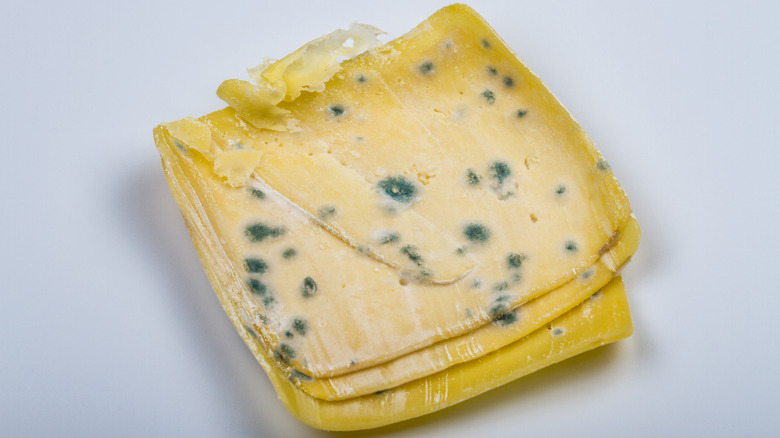What It Means When Your Cheese Smells Like Ammonia
Cheese, cheese, what's not to love about glorious cheese? Everything seems better with a bit of cheese piled on top, and iconic dishes, such as mac and cheese, the double cheeseburger, and deep-dish pizza, are all incomplete without this delectable dairy product. Yet nothing can ruin a perfect meal quicker than adding a fistful of rancid cheese to your dish. It is not always so easy to tell if your cheese has spoiled because looks can often be deceiving. That is why the sense of smell plays such a crucial role when it comes to determining if cheese is fresh.
In the rarified world of high-end gourmet cuisine, stinky cheeses are often extremely desirable and some authorities, such as Australia's SBS, claim that "when it comes to cheese, the stinkier the better." But all stinks are not created equal, and there are some smells you particularly want to avoid. Here's everything you need to know about stinky cheese, and what it means if your cheese smells like ammonia.
Other signs that cheese is no good
Not all cheeses are the same and some cheeses, such as brie and camembert, are more prone to have an ammonia-like smell. Yet there is no need to panic, as this is not necessarily a sign that the cheese is bad. According to Cooks Illustrated, the smell is most likely due to the cheese-making process as it is related to the mold and bacteria growing on the rind. In an interview with the magazine, cheese expert Ihsan Gurdal suggested unwrapping and resting all soft cheeses before serving. He suggests that taking cheeses (especially those that have been refrigerated) and allowing them sit at room temperature for at least an hour to diminish any ammonia smell. If the strong smell is still there or you spot any brown, orange or gray spots on the mold rind, he advises to simply discard the cheese.
If the smell of ammonia is overwhelming or extremely pungent it's best to err on the side of caution and avoid consuming the cheese, this is true of any type of cheese you may purchase. It's also a good idea to pay close attention to the color, texture, taste, and smell of any cheese you purchase. It's best to eat cheese as close to the date of purchase as possible and discard any product that is chalky, grainy or has a sour taste (via thewholeportion).

